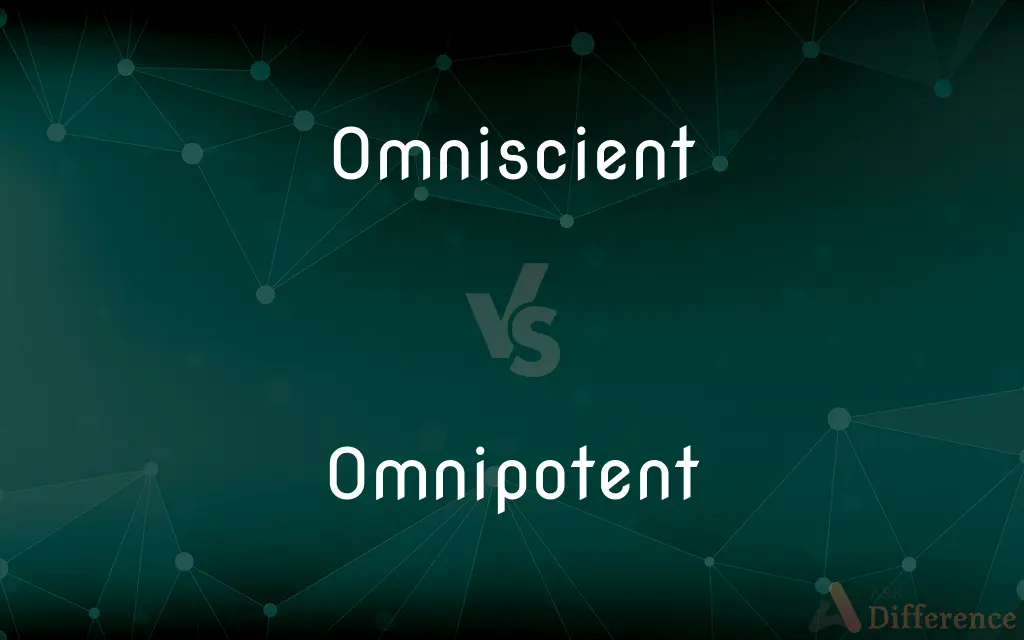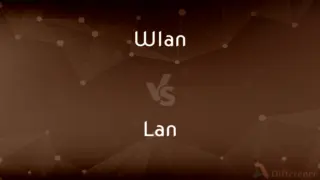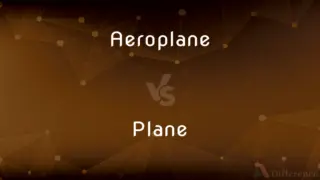Omniscient vs. Omnipotent — What's the Difference?
By Tayyaba Rehman — Updated on October 30, 2023
Omniscient means all-knowing, while Omnipotent means all-powerful. Omniscient is about complete knowledge, and Omnipotent is about unlimited power. Both terms are often attributes given to deities or supreme beings.

Difference Between Omniscient and Omnipotent
Table of Contents
ADVERTISEMENT
Key Differences
Omniscient is a term that originates from the Latin word "omnis", meaning "all", and "scientia", meaning "knowledge". Thus, when someone or something is described as Omniscient, it indicates that they possess complete or unlimited knowledge. Omnipotent, on the other hand, comes from "omnis", meaning "all", and "potens", which means "powerful". As such, Omnipotent refers to having unlimited power or the ability to do anything.
In religious contexts, both Omniscient and Omnipotent are attributes often ascribed to a supreme being or deity. While an Omniscient deity would know everything about the past, present, and future, an Omnipotent deity would have the power to create, change, or destroy anything. These concepts are foundational in many theological discussions.
From a literary perspective, Omniscient often refers to a type of third-person narration where the narrator knows the thoughts and feelings of all characters. In contrast, an Omnipotent character in a story would be one who possesses unbeatable power or authority, perhaps even the ability to reshape the narrative itself.
While both terms signify forms of ultimate capability, their domains are different. Omniscient concerns the realm of knowledge and understanding, whereas Omnipotent governs the sphere of capability and action. Both words, however, evoke a sense of vastness and limitlessness, often beyond human comprehension.
Comparison Chart
Definition
All-knowing
All-powerful
ADVERTISEMENT
Origin of Word
From Latin "omnis" (all) and "scientia" (knowledge)
From Latin "omnis" (all) and "potens" (powerful)
Grammatical Use
Adjective
Adjective
Associated Realm
Knowledge
Power
Sample Sentence Use
"The narrator seemed Omniscient, knowing every character's innermost thoughts."
"The king was considered Omnipotent, his word was law in the kingdom."
Compare with Definitions
Omniscient
Possessing complete and unlimited knowledge.
The Omniscient being foresaw all events of the future.
Omnipotent
Possessing infinite might or authority.
The ancient artifact granted its holder Omnipotent strength.
Omniscient
Aware of all things, events, or facts.
Her Omniscient wisdom was sought by many.
Omnipotent
Supreme in power; unparalleled.
The empire saw their emperor as an Omnipotent leader.
Omniscient
Having infinite awareness or insight.
With Omniscient clarity, he predicted the outcome.
Omnipotent
Capable of doing or achieving anything.
The genie was an Omnipotent entity granting any wish.
Omniscient
Pertaining to an all-knowing viewpoint in literature.
The Omniscient narrator revealed secrets of every character.
Omnipotent
Almighty or infinite in power, as God.
Believers prayed to an Omnipotent deity for guidance.
Omniscient
Universally and constantly informed.
The elders believed in an Omniscient cosmos.
Omnipotent
Having unlimited or absolute power.
The Omnipotent ruler could command anything.
Omniscient
Having total knowledge; knowing everything
An omniscient deity.
The omniscient narrator.
Omnipotent
Having unlimited or universal power, authority, or force; all-powerful.
Omniscient
One having total knowledge.
Omnipotent
One having unlimited power or authority
The bureaucratic omnipotents.
Omniscient
Omniscient God. Used with the.
Omnipotent
Omnipotent God. Used with the.
Omniscient
Having total knowledge.
The story was narrated from an omniscient point of view.
The Abrahamic God is omniscient.
Omnipotent
Having unlimited power, force or authority.
Omniscient
One who has total knowledge.
Omnipotent
(biology) Describing a cell (especially a stem cell) that is capable of developing into any type of cell or forming any type of tissue (also called a totipotent cell).
Omniscient
Having universal knowledge; knowing all things; infinitely knowing or wise; as, the omniscient God.
For what can scape the eyeOf God all-seeing, or deceive his heartOmniscient?
Omnipotent
An omnipotent being.
Omniscient
Infinitely wise
Omnipotent
Able in every respect and for every work; unlimited in ability; all-powerful; almighty; as, the Being that can create worlds must be omnipotent.
God's will and pleasure and his omnipotent power.
Omnipotent
Having unlimited power of a particular kind; as, omnipotent love.
Omnipotent
Having unlimited power
Common Curiosities
What does Omniscient mean?
Omniscient means all-knowing or possessing complete knowledge.
Can humans be described as Omnipotent?
Generally, no. The term implies infinite power, which humans do not possess.
Does Omniscient mean understanding everything?
Yes, Omniscient implies awareness and understanding of all things.
Can a being be both Omniscient and Omnipotent?
Yes, many religious beliefs attribute both qualities to their deities.
What's the root of the word Omnipotent?
Omnipotent comes from Latin "omnis" (all) and "potens" (powerful).
Is every deity considered Omnipotent in religious texts?
Not all. The concept of an Omnipotent deity varies among religions.
How can Omniscient be used in a sentence?
"She believed the universe was an Omniscient entity that saw all actions."
How does Omnipotent differ from Omniscient?
While Omniscient refers to all-knowing, Omnipotent means all-powerful.
Is Omniscient a term used in literature?
Yes, an Omniscient narrator knows the thoughts and feelings of all characters.
Can a literary character be Omnipotent?
Yes, characters with unlimited power in a story can be described as Omnipotent.
Are there any limitations to an Omnipotent being's power?
By definition, no. Omnipotent implies unlimited and absolute power.
Which term, Omniscient or Omnipotent, relates to knowledge?
Omniscient is related to knowledge, meaning all-knowing.
How is Omniscient different from wise?
While both imply knowledge, Omniscient is all-knowing, while wise refers to experience and good judgment.
Is the concept of Omnipotent limited to religious contexts?
No, the term can be used in any context to describe unmatched power or authority.
Can something be nearly Omnipotent?
While the term implies absolute power, it can be used figuratively to describe great, but not unlimited, power.
Share Your Discovery

Previous Comparison
WLAN vs. LAN
Next Comparison
Aeroplane vs. PlaneAuthor Spotlight
Written by
Tayyaba RehmanTayyaba Rehman is a distinguished writer, currently serving as a primary contributor to askdifference.com. As a researcher in semantics and etymology, Tayyaba's passion for the complexity of languages and their distinctions has found a perfect home on the platform. Tayyaba delves into the intricacies of language, distinguishing between commonly confused words and phrases, thereby providing clarity for readers worldwide.















































